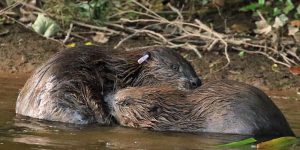“The emphasis was on benefits from beavers to the rural economy and ecotourism, and in providing nature-based solutions to flooding, but not on biodiversity loss arising from construction of dams and other beaver activities.”
.
 Next week, the Devon Wildlife Trust’s Mark Elliot will be talking about the reintroduction of the beaver on the River Otter:
Next week, the Devon Wildlife Trust’s Mark Elliot will be talking about the reintroduction of the beaver on the River Otter:
online talk: returning the beaver – Vision Group for Sidmouth
.
With more on their website:
photo credit: Dave White and the DWT
.
For a contrary opinion, the Game and Wildlife Conservation Trust has just published a report it commissioned on the reintroduction of the beaver.
Click on the link below for lots of interesting comment which follows:
.
Environmental engineer or a waterway menace?
There has been much media coverage about the reintroduction of Eurasian beavers into the countryside, but are they clever engineers whose dams benefit other species or are they a waterway menace? …
The River Otter Beaver Trial
The River Otter Beaver Trial (ROBT) has now reported to Natural England and Defra and we feel that its beaver management process is flawed from a fisheries perspective. The trial was also too narrow in scope to provide robust evidence to inform decisions on further unenclosed reintroductions, and too short to understand the full implications of reintroducing beavers into open catchments. The emphasis was on benefits from beavers to the rural economy and ecotourism, and in providing nature-based solutions to flooding, but not on biodiversity loss arising from construction of dams and other beaver activities.
Given our concerns, particularly on the impacts of their dams on migratory salmonids, we are working with the Angling Trust, Salmon & Trout Conservation, Atlantic Salmon Trust, River Otter Fisheries Association and the South West Rivers Association. We collectively commissioned Professor Ian Cowx (University of Hull International Fisheries Institute) to independently review ‘wild’ beaver impacts on salmon, trout and sea trout with particular reference to UK rivers, including the published science and evidence report from the ROBT. Professor Cowx’s report is now published and has been sent to George Eustice, the Secretary of State for the Environment, Food and Rural Affairs, Defra and Natural England who are due to open a consultation in spring 2021…
Looking to the future – the GWCT position
Based on the report produced by Professor Cowx our position is:
- Managing beavers and their dams for fish conservation needs to be an integral part of any future beaver management strategy.
- There is currently insufficient scientific evidence to develop a robust strategy to manage interactions between beavers, their dams and fish.
- There needs to be fully funded research, including telemetry studies, on the upstream and downstream possibility of a range of dam types, including cascades of dams, and for a full range of species.
- There should be a cessation of open and enclosed beaver releases until a funded management strategy based on research is produced.
- Any future management strategy should be simple, low in bureaucracy and similar to other species like deer and foxes.
Environmental engineer or a waterway menace? – Game and Wildlife Conservation Trust